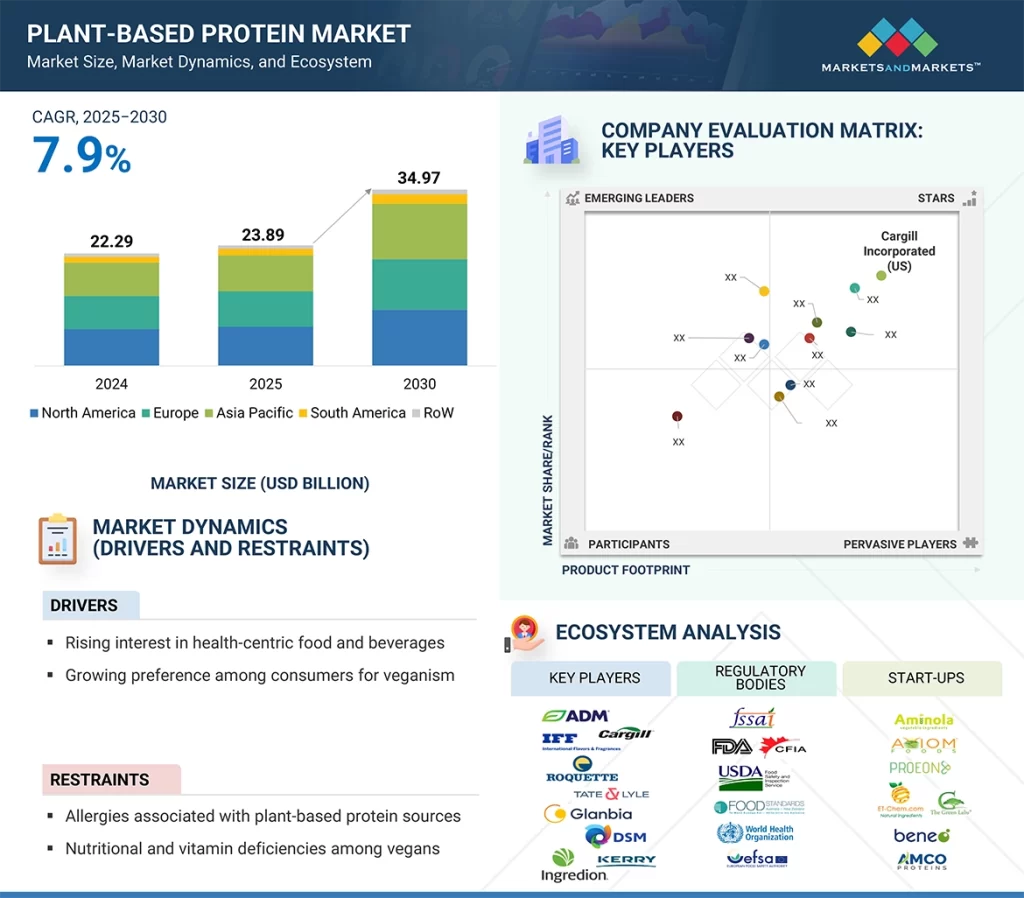The plant-based protein market is witnessing unprecedented growth, fueled by shifting consumer preferences, technological innovations, and increasing health and sustainability awareness. According to MarketsandMarkets, the global plant-based protein market is projected to rise from USD 23.89 billion in 2025 to USD 34.97 billion by 2030, growing at a CAGR of 7.9%.
This momentum reflects a global shift toward healthier, sustainable, and animal-free protein options that appeal to vegans, vegetarians, and flexitarians alike.

Driving Forces Behind Growth
One of the biggest growth drivers is the rising awareness of the health benefits of plant-based diets. Consumers are actively replacing conventional meat patties and sausages with plant-infused meat alternatives, driving strong demand for plant-based proteins.
Additionally, advancements in food technology—such as precision fermentation and protein extraction from novel sources like peas, chickpeas, algae, and fungi—have made plant-based foods more appealing in terms of flavor, texture, and nutrition.
Major food companies, including Nestlé (Switzerland) and Unilever (UK), are investing heavily in R&D to create innovative, high-quality plant-based solutions that continue to expand the market.
Download PDF Brochure: https://www.marketsandmarkets.com/pdfdownloadNew.asp?id=14715651
Regional Outlook: North America Leading the Way
- North America is expected to dominate the plant-based protein market during the forecast period. Several factors are fueling this trend:
- Rising adoption of vegan, vegetarian, and flexitarian diets, especially among Millennials and Gen Z.
- Regulatory support from the U.S. FDA and Health Canada, which are ensuring clear labeling and safety standards.
- Increased accessibility through mainstream retail and food service channels.
This combination of consumer demand and regulatory clarity is strengthening market expansion across the region.
Soy Protein: The Market Leader
Plant-based proteins are sourced from soy, wheat, peas, fava beans, oats, rice, quinoa, tempeh, and seeds, among others. Among these, soy protein has emerged as the most dominant segment.
Why soy protein?
- High amino acid profile and protein content make it nutritionally competitive with animal proteins.
- Affordability compared to other protein sources.
- Versatility in food manufacturing—from bakery products to gluten-free formulations.
With increasing focus on sustainable and plant-forward diets, soy protein is expected to maintain its stronghold in the evolving protein landscape.
Request Sample Pages: https://www.marketsandmarkets.com/requestsampleNew.asp?id=14715651
Feed Applications: Fastest-Growing Segment
- Interestingly, plant-based proteins are also witnessing surging demand in animal feed applications.
- North America and Asia Pacific, being major meat producers, are driving this trend.
- The industry is shifting from unrefined forms of plant proteins to high-quality isolates that improve nutritional value.
- Innovations in feed formulation are supporting the need for better nutrition and sustainability in animal agriculture.
This segment is expected to record the fastest growth during the forecast period.
Leading Plant-Based Protein Manufacturers:
The plant-based protein market is highly competitive, with global leaders actively pursuing innovation and expansion. Key players include:
- Cargill, Incorporated (US)
- ADM (US)
- Kerry Group PLC (Ireland)
- International Flavors & Fragrances Inc. (US)
- Ingredion Incorporated (US)
- Wilmar International Ltd. (Singapore)
- Roquette Frères (France)
- Glanbia PLC (Ireland)
- DSM-Firmenich (Switzerland)
- AGT Food and Ingredients (Canada)
- Tate & Lyle (UK)
- Burcon (Canada)
- Emsland Group (Germany)
- PURIS (US)
- COSUCRA (Belgium)
These companies are expanding their market presence through R&D investments, product innovation, strategic partnerships, and acquisitions. By leveraging cutting-edge technologies, they are introducing next-generation plant-based protein solutions to meet evolving consumer and industry demands.

